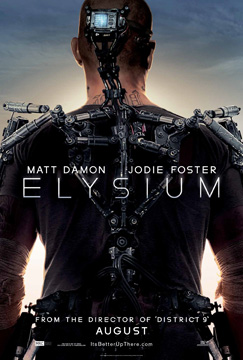 Nick Nunziata: Elysium isn’t just another late Summer science fiction movie. It’s a test for one of the most promising filmmakers in the world. Neill Blomkamp’s District 9 was nothing less than an instant classic and the arrival of a major filmmaking force able to strike a rare balance of social commentary with fresh action. With big stars and a bigger budget either the sky’s the limit or the sophomore slump is the ceiling. Blomkamp’s story of a regular man trapped between worlds is sadly closer to the latter though not without its charms. In a weird way it’s the grittier side of Joseph Kosinski’s Oblivion, a film with a fully realized future world but not enough life in it to warrant major attention.
Nick Nunziata: Elysium isn’t just another late Summer science fiction movie. It’s a test for one of the most promising filmmakers in the world. Neill Blomkamp’s District 9 was nothing less than an instant classic and the arrival of a major filmmaking force able to strike a rare balance of social commentary with fresh action. With big stars and a bigger budget either the sky’s the limit or the sophomore slump is the ceiling. Blomkamp’s story of a regular man trapped between worlds is sadly closer to the latter though not without its charms. In a weird way it’s the grittier side of Joseph Kosinski’s Oblivion, a film with a fully realized future world but not enough life in it to warrant major attention.
Renn Brown: This is certainly as problematic as any blockbuster we’ve seen this year, with the pedigree and few evident strengths of the film making the reality of its failures that much more disappointing. This is Blomkamp’s story and script, and he flat-out fails to follow up District 9 with as fine-tuned a balance of character, story, and aesthetic. Though sharply structured and paced, few elements of the film ever hook in and build into anything memorable or compelling- the invisible wall between us and Matt Damon’s strongly-acted lead character being the most obvious and most damaging example.
With Elysium, Blomkamp seems to have been attempting a contemporary take on a John Carpenter film, with broad social allegory setting the stage for genre action. It most strongly recalls Escape From New York, with Blomkamp dumping our current economic and political atmosphere into a centrifuge and then starting his hyperbolizing from there. The 99.999% live in squalor on earth, while the richest of the rich live on a lavish satellite- the building of which would certainly put the world into an economic disaster in and of itself. Society on Earth is impersonally run by drones, droids, and algorithms, even as the vestiges of normal society are there, beneath the dust and rubble. Our hero is put in the impossible situation of needing to reach Elysium and use their medical facilities to live –as thousands of others do, and dozens unsuccessfully attempt each day– forcing him back into the underworld he left behind. These setups are strong enough, but the complexity ends there.
Nick Nunziata: Damon’s good but his Max severely underwritten. The framing device of a childhood promise he makes to a girl and the teachings of a nun serving as his motivation doesn’t elevate the character to a level warranting hero status. Additionally, throughout the film the character goes through great lengths to stay alive but there’s nothing in his life or ambition which suggests a life worth living. Life is cheap on Earth in Blomkamp’s vision and as a reformed criminal there’s precious little to Max. There no dream or great goal other than being able to live on the majestic Elysium. It’s not enough, though Damon does as much as possible with the character. The supporting cast is a mixed bag as well with Sharlto Copley having a blast as the oddity that is Kruger and William Fichtner playing an elitist businessman with aplomb but Jodie Foster sporting an awful forced accent and Alice Braga delivering zero charm as the adult incarnation of Max’s beloved add little zest. Diego Luna brings heart to the proceedings but in reality he should have played Wagner Moura’s Spider character, one which has much more screen time and importance in the story. Moura simply doesn’t deliver and the film’s last act suffers for it.
 Renn Brown: There’s a buried layer of Max that is desperate to survive- afraid of death and willing to burn everything to the ground to circumvent it. That’s a fine setup for the ultimate heroic payoff the film drives towards, except it’s not developed or meaningfully explored- it creeps into the character like an afterthought. In fact, we have very few private moments or other events in which we can get a deeper window into what makes Max tick. The flashbacks simply don’t cut it and, without any breathing room to blossom, the romantic angle does do much to bolster it.
Renn Brown: There’s a buried layer of Max that is desperate to survive- afraid of death and willing to burn everything to the ground to circumvent it. That’s a fine setup for the ultimate heroic payoff the film drives towards, except it’s not developed or meaningfully explored- it creeps into the character like an afterthought. In fact, we have very few private moments or other events in which we can get a deeper window into what makes Max tick. The flashbacks simply don’t cut it and, without any breathing room to blossom, the romantic angle does do much to bolster it.
What takes Elysium from merely deficient to occasionally eyeroll-worthy is that the world-building is consistnetly paper thin where it matters. For all the badass weapons and clever aesthetic touches –and there are tons– we get nothing about the residents of Elysium except that they’re rich white people who read, have cocktail parties, and are secretly led by a power-hungry cartoon villain. What’s worse is that the great healthcare gap that the film revolves around is extraordinarily reductive, to the point that is utterly meaningless as a science fiction-tinged reflection on our world and its very real dilemmas. As it is, a bunch of people on a satellite with no actual lives that we can see hold out on medical technology purely because they’re giant dicks. Our hero unwittingly gets wrapped up in a plot that may tear that system down, but with no emotional or intellectual investment in our hero OR the allegory in play, the plot is ultimately a whiff. This means all the coincidences, shortcuts, and leaps of logic stand out like neon signs, where they would easily be accepted in a more cogent genre film.
This leaves us with the action, which is plentiful and beautifully executed, save for a few clunky hand-to-hand brawls. Blomkamp has an undeniable eye for scope and sweeping momentum, with chases and firefights as sharp-edged as any action film of the last few years. Messy gore bursts forth at key moments to add real danger to each sequence, contrasting the clean operation of so much technology. This stuff works. It’s just not enough.
Nick Nunziata: Another minor flaw in the plot is that the whole order of Elysium runs on a DOS program that can overwrite everything in the system. This isn’t ID4 where a dumb plot device involving beating an alien adversary with a computer virus is only the fifth dumbest thing. This is a movie aiming higher. It has ideas. They just aren’t all that well executed.Worse yet, the cool stuff Blomkamp has proved an adept at are here but never reach the levels he achieved in District 9. The weapons aren’t cooler, the action scenes aren’t a step forward, and the armature Max is retrofitted with never really amounts to much. It just goes to show that the “visionary” tag only works if the meat rises up to the visuals. Elysium isn’t a lateral step for the filmmaker. It’s a step back. Without the strong producer presence of Peter Jackson is Neill Blomkamp just another shooter with good FX skills? Was District 9 an anomaly? Doubtful, but this reeks of not nearly enough script polish and perhaps a little too much editing room snipping.

Renn Brown: Blomkamp certainly has a special perspective to offer blockbuster films but if allegorical action is going to continue to be his thing, he needs to team up with a stronger writer or go back to the basics of what made District 9 such a coup. That film was ostensibly a very real scenario passed through a genre prism- the “world building” was more about reinforcing reality while the real show was the detail in the stories of Wikus and Christopher Johnson. Again, Matt Damon is as commanding a lead actor as ever, but he’s operating at arm’s length from the audience. Were there more room to be invested in his journey, the conveniences of when technology does or does not work and other lazier plot mechanisms would be forgiven. In fact –and I’m kind of repeating myself here– the social commentary here also rings hollow for similar reasons. There’s no ambiguity. Elysium and its residents are merely bad, we know nothing of them, and there’s no thought given to the idea that its medical technology relies on any kind of finite resource. Nobody has to make a hard choice. That’s a damn shame because there are relevant, potent ideas to engage here.
Nick Nunziata: Maybe it’s just a simple matter of perception. A lot of people saw District 9 and felt they were seeing the arrival of the next James Cameron or whomever your filmmaker extraordinaire is when it comes to these kind of genre movies. Swimming in the waters of Neil Marshall and Paul W.S. Anderson, Neill Blomkamp fits perfectly. Elysium showcases a director with serious visual skills but perhaps a disconnect between ambition and execution.
Rating: 




Out of a Possible 5 Stars
Renn Brown: A true blockbuster writer/director is a rare thing, and here it’s easy to see why. The expansion of scale and a broader sweep of the story are not kind to Blomkamp’s talents, which I remain (shakily) convinced are real and vital. The elements are present, and this is in many ways a world I would have liked to seen more robustly explored or, conversely, tightened further so that our small window could be richer and more consistent. The reality is that Elysium sits in a poorly-functioning middle ground that blurs the best of its human elements and iconic bits of world-building. Copley’s Agent Kruger would be a classic villain coming out of a better film, and it’s not hard to imagine the universe in which Matt Damon’s hulking, exoskeletoned frame was a perfect, cathartic merging of Hollywood’s robot fixation with a flesh-and-blood hero. But nothing sticks. Alas, the iconic, emotional, and intellectual potential of Elysium slips like sand through Blomkamp’s fingers, with a small, smooth pile of decent action and fun moments all that’s left behind.
Rating: 




Out of a Possible 5 Stars
